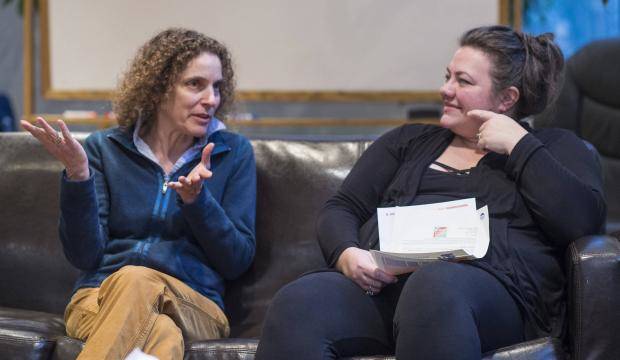AWARE (Aiding Women in Abuse and Rape Emergencies) exists at intersections.
When people come to us, they’re in transition — with their relationships, their housing, their employment, and with how to best meet their needs and the needs of their children. All are working toward safety. A common hurdle in working toward safety and stability is addressing the impact of trauma. A traumatic experience leaves a person with thoughts and feelings that don’t connect or coalesce, impacting them in profound ways. While everyone’s specific response to trauma is unique, those who lack support from their community are less likely to find a path to recovery. One effect of a traumatic event is mental illness. Like the cloak of silence around abuse, mental illness is similarly hidden. Open and frank talks about mental health are healing, and help people realize that another way of being in the world is possible.
Trauma is also a central issue for many people who have substance use disorders. People often use substances to numb the pain of abuse. AWARE supports individuals who want to address interpersonal violence, substance use disorders and mental illness. Many AWARE participants arrive because they want their lives to be different, and they need help sorting through how to make that happen. The decision to live differently requires immense courage. At AWARE, we recognize that it is difficult to get sober or work on mental health without consistent housing, food, medical care and a supportive community.
You may have heard the term behavioral health; this is a way of thinking about well-being that links the prevention and treatment of mental illness and substance use disorders. People with behavioral health needs are more vulnerable and at greater risk of further victimization. AWARE creates support networks, including Juneau’s Disability Abuse Response Team (DART) for participants by working with other agencies and helpers. We connect participants to services and assist them in feeling comfortable in the care of others. This requires and builds trust, strength and community.
An untreated wound will lead to a host of other medical conditions making healing more complex. We encourage participants to put words to their difficult experiences, with advocates, with others who are going through similar experiences, in groups and with counselors. Community is the healing balm to isolation. Some discussions are easier to have; depression and anxiety are mental illnesses that many people deal with daily. While talking about these conditions has become easier, living with them is still a challenge. They are often found alongside other mental illnesses and substance use; the presence of multiple conditions means we need to treat the whole person. The Substance Abuse and Mental Health Services Administration states that people with serious mental illness have higher incidence of unemployment, incarceration and homelessness. According to the Centers for Medicare &Medicare Services, for people with mental illness or substance use disorder and a common chronic condition, the health care costs are two to three times higher than an average Medicaid enrollee pays. We cannot address these issues in isolation.
When we look at statistics, we see certain groups of people systematically experience greater obstacles to health based on particular variables. These include, but are not limited to, socioeconomic status, gender, age, race and ethnicity, sexual orientation and geographic location. When these factors overlap, access to care is restricted and results in poor behavioral health outcomes. This also relates to the need for a diverse health care workforce and the need for cultural competence and humility. Putting more resources to working with all people, and bringing the quality of care up for those who have historically been excluded is vital.
Drugs and alcohol are common coping mechanisms for people who’ve experienced trauma. If you are reading this and feeling challenged or would like to reach out, or know someone who might like to reach out, please know AWARE is available 24/7 at 586-1090. We will help when we can and refer people to our local partners who could be a better fit. We are here to listen to you and help find ways we can all be safer.
• Saralyn Tabachnick is executive director of AWARE Inc., providing comprehensive prevention and intervention services addressing domestic and sexual violence in Juneau and northern Southeast Alaska.

